Front Radar Sensor (C1A10)
DESCRIPTION
The forward recognition camera uses the millimeter wave radar sensor assembly to detect obstacles in front of the vehicle.
When
the forward recognition camera receives information that there is an
internal malfunction in the millimeter wave radar sensor assembly, DTC
C1A10 is stored.
|
DTC No. | Detection Item |
DTC Detection Condition | Trouble Area |
|
C1A10 | Front Radar Sensor |
When all of the following conditions are met:
- 2 seconds after the power switch is turned on (IG)
- The vehicle speed is 5 km/h (4 mph) or more.
- A signal from the millimeter wave radar sensor assembly indicating that
there is an internal malfunction in millimeter wave radar sensor
assembly is detected by the forward recognition camera for 5 seconds or
more.
| Millimeter wave radar sensor assembly |
CAUTION / NOTICE / HINT
NOTICE:
- When replacing the millimeter wave radar sensor assembly, always replace
it with a new one. If a millimeter wave radar sensor assembly which was
installed to another vehicle is used, the information stored in the
millimeter wave radar sensor assembly will not match the information
from the vehicle. As a result, a DTC may be stored.
- When the millimeter wave radar sensor assembly is replaced with a new
one, adjustment of the radar sensor beam axis must be performed.
Click here 
- The front camera system uses the CAN communication system. First,
confirm that there are no malfunctions in the CAN communication system.
Refer to How to Proceed with Troubleshooting.
Click here 
PROCEDURE
|
1. | REPLACE MILLIMETER WAVE RADAR SENSOR ASSEMBLY |
(a) Replace the millimeter wave radar sensor assembly.
Click here

(b) Adjust the millimeter wave radar sensor assembly.
Click here 
| NEXT |
 | END |
Front Radar Sensor Incorrect Axial Gap (C1A11,C1A14)
DESCRIPTION
The forward recognition camera uses the millimeter wave radar sensor assembly to detect obstacles in front of the vehicle.
When
the vehicle is determined to be driving in a straight line or on a
gradual curve based on signals from the yaw rate sensor etc., the
millimeter wave radar sensor assembly performs self diagnosis to check
if the sensor beam axis has deviated from the vehicle movement
direction. When the millimeter wave radar sensor assembly beam axis has
deviated, the forward recognition camera detects this, and stores DTC
C1A11.
After installing a new millimeter wave
radar sensor assembly, if sensor beam axis adjustment is not performed,
DTC C1A14 is stored.
|
DTC No. | Detection Item |
DTC Detection Condition | Trouble Area |
|
C1A11 | Front Radar Sensor Incorrect Axial Gap |
2
seconds after the power switch is turned on (IG), misalignment of the
millimeter wave radar sensor assembly is detected for approximately 5
seconds. | Pre-collision system |
|
C1A14 | Front Radar Sensor Beam Axis Not Adjusted |
2
seconds after the power switch is turned on (IG), incompletion of the
millimeter wave radar sensor assembly beam axis alignment is detected
for approximately 5 seconds. | Pre-collision system |
PROCEDURE
| 1. |
GO TO PRE-COLLISION SYSTEM |
HINT:
If DTC C1A11 or C1A14 is output by the front camera system, perform troubleshooting for the pre-collision system.
Click here 
| NEXT |
 | END |
Front Camera Module Circuit (C1AA0)
DESCRIPTION
When an internal malfunction is detected in the forward recognition camera, DTC C1AA0 is stored.
|
DTC No. | Detection Item |
DTC Detection Condition | Trouble Area |
|
C1AA0 | Front Camera Module Circuit |
2 seconds after the power switch is turned on (IG), the forward recognition camera detects an internal malfunction. |
Forward recognition camera |
CAUTION / NOTICE / HINT
NOTICE:
- When replacing the forward recognition camera, always replace it with a
new one. If a forward recognition camera which was installed to another
vehicle is used, the information stored in the forward recognition
camera will not match the information from the vehicle. As a result, a
DTC may be stored.
- If the forward recognition camera has been replaced with a new one, be sure to perform forward recognition camera adjustment.
Click here 
PROCEDURE
|
1. | REPLACE FORWARD RECOGNITION CAMERA |
(a) Replace the forward recognition camera.
Click here

(b) Perform forward recognition camera adjustment.
Click here 
| NEXT |
 | END |
FCM Destination Information Unmatched (C1AA1)
DESCRIPTION
When the
forward recognition camera is replaced with a new one, the new forward
recognition camera attempts to store country specification information
received from the main body ECU (multiplex network body ECU) and hybrid
vehicle control ECU. If the country specification information stored in
the forward recognition camera is different from that stored in the main
body ECU (multiplex network body ECU) or hybrid vehicle control ECU,
DTC C1AA1 is stored.
|
DTC No. | Detection Item |
DTC Detection Condition | Trouble Area |
|
C1AA1 | FCM Destination Information Unmatched |
2
seconds after the power switch is turned on (IG), destination
information stored in the forward recognition camera and that received
from the main body ECU (multiplex network body ECU) or hybrid vehicle
control ECU do not match for 5 seconds or more. |
- CAN communication system
- Forward recognition camera
- Main body ECU (Multiplex network body ECU)
- Hybrid vehicle control ECU
|
CAUTION / NOTICE / HINT
NOTICE:
- Recognition code registration is necessary when replacing the main body ECU (multiplex network body ECU).
- If the main body ECU (multiplex network body ECU) is replaced, refer to Registration.
Click here 
- When replacing the forward recognition camera, always replace it with a
new one. If a forward recognition camera which was installed to another
vehicle is used, the information stored in the forward recognition
camera will not match the information from the vehicle. As a result, a
DTC may be stored.
- If the forward recognition camera has been replaced with a new one, be sure to perform forward recognition camera adjustment.
Click here 
HINT:
This
DTC is stored when the destination information stored in the forward
recognition camera and that stored in the main body ECU (multiplex
network body ECU) do not match. If the forward recognition camera or
main body ECU (multiplex network body ECU) has been replaced, check if a
forward recognition camera or main body ECU (multiplex network body
ECU) from another vehicle was used.
PROCEDURE
HINT:
When DTC C1AA1 is stored, lane departure alert system (w/ steering control) DTC C1AAC may be stored at the same time.
(a) Check for DTCs.
Chassis > LKA/LDA > Trouble Codes
|
Result | Proceed to |
|
DTC C1AAC is not output |
A |
| DTC C1AAC is output |
B |
| B |
 | GO TO DTC CHART (C1AAC) |
|
A |
 | |
HINT:
The
forward recognition camera communicates with the main body ECU
(multiplex network body ECU) via CAN communication. Confirm that the CAN
communication system is functioning normally before proceeding.
(a) Check for DTCs.
Chassis > Front Recognition Camera > Trouble Codes
|
Result | Proceed to |
|
DTC U0142 is not output |
A |
| DTC U0142 is output |
B |
| B |
 | GO TO CAN COMMUNICATION SYSTEM |
|
A |
 | |
(a) Clear the DTCs.
Chassis > Front Recognition Camera > Clear DTCs
(b) Make sure that the DTC detection conditions are met.
HINT:
If the detection conditions are not met, the system cannot detect the malfunction.
(c) Check for DTCs.
Chassis > Front Recognition Camera > Trouble Codes
|
Result | Proceed to |
|
DTC C1AA1 is not output |
A |
| DTC C1AA1 is output |
B |
| A |
 | USE SIMULATION METHOD TO CHECK |
|
B |
 | |
| 4. |
REPLACE FORWARD RECOGNITION CAMERA |
(a) Replace the forward recognition camera.
Click here 
(b) Perform forward recognition camera adjustment.
Click here 
|
NEXT |
 | |
(a) Clear the DTCs.
Chassis > Front Recognition Camera > Clear DTCs
(b) Make sure that the DTC detection conditions are met.
HINT:
If the detection conditions are not met, the system cannot detect the malfunction.
(c) Check for DTCs.
Chassis > Front Recognition Camera > Trouble Codes
|
Result | Proceed to |
|
DTC C1AA1 is not output |
A |
| DTC C1AA1 is output |
B |
| A |
 | END (FORWARD RECOGNITION CAMERA WAS DEFECTIVE) |
| B |
 | REPLACE MAIN BODY ECU (MULTIPLEX NETWORK BODY ECU) |
Vehicle Speed Sensor Circuit (C1AA3)
DESCRIPTION
The forward
recognition camera receives vehicle speed signals from the skid control
ECU (brake booster with master cylinder assembly). If the skid control
ECU (brake booster with master cylinder assembly) receives a vehicle
speed sensor malfunction signal, it informs the forward recognition
camera via CAN communication, and DTC C1AA3 is stored.
|
DTC No. | Detection Item |
DTC Detection Condition | Trouble Area |
|
C1AA3 | Vehicle Speed Sensor Circuit |
2
seconds after the power switch is turned on (IG), a signal from the
skid control ECU (brake booster with master cylinder assembly)
indicating a malfunction in a vehicle speed sensor is detected by the
forward recognition camera for 5 seconds or more. |
Electronically controlled brake system |
CAUTION / NOTICE / HINT
NOTICE:
The
front camera system uses the CAN communication system. First, confirm
that there are no malfunctions in the CAN communication system. Refer to
How to Proceed with Troubleshooting.
Click here

PROCEDURE
| 1. |
GO TO ELECTRONICALLY CONTROLLED BRAKE SYSTEM |
HINT:
If DTC C1AA3 is output by the front camera system, perform troubleshooting for the electronically controlled brake system.
Click here 
| NEXT |
 | END |
Yaw Rate Sensor Circuit (C1AA4,C1AA5)
DESCRIPTION
The forward
recognition camera receives vehicle stability signals from the yaw rate
sensor (airbag ECU assembly). If the yaw rate sensor (airbag ECU
assembly) detects an abnormal yaw rate sensor signal or yaw rate sensor
power supply voltage, it informs the forward recognition camera via CAN
communication, and DTC C1AA4 or C1AA5 is stored.
|
DTC No. | Detection Item |
DTC Detection Condition | Trouble Area |
|
C1AA4 | Yaw Rate Sensor Circuit |
2
seconds after the power switch is turned on (IG), a signal from the yaw
rate sensor (airbag ECU assembly) indicating a malfunction in the yaw
rate sensor is detected by the forward recognition camera for 5 seconds
or more. | Electronically controlled brake system |
|
C1AA5 | Yaw Rate Sensor Power Supply Voltage Circuit |
2
seconds after the power switch is turned on (IG), a signal from the yaw
rate sensor (airbag ECU assembly) indicating an abnormal yaw rate
sensor power supply voltage signal is detected by the forward
recognition camera for 5 seconds or more. |
Electronically controlled brake system |
CAUTION / NOTICE / HINT
NOTICE:
The
front camera system uses the CAN communication system. First, confirm
that there are no malfunctions in the CAN communication system. Refer to
How to Proceed with Troubleshooting.
Click here

PROCEDURE
| 1. |
GO TO ELECTRONICALLY CONTROLLED BRAKE SYSTEM |
HINT:
If
DTC C1AA4 or C1AA5 is output by the front camera system, perform
troubleshooting for the electronically controlled brake system.
Click here

| NEXT |  |
END |
Yaw Rate Sensor Zero Point Malfunction (C1AA6)
DESCRIPTION
The skid
control ECU (brake booster with master cylinder assembly) receives
vehicle stability signals from the yaw rate sensor (airbag ECU
assembly). If the skid control ECU (brake booster with master cylinder
assembly) detects a yaw rate sensor zero point malfunction signal, it
informs the forward recognition camera via CAN communication, and DTC
C1AA6 is stored.
|
DTC No. | Detection Item |
DTC Detection Condition | Trouble Area |
|
C1AA6 | Yaw Rate Sensor Zero Point Malfunction |
2
seconds after the power switch is turned on (IG), a signal from the
skid control ECU (brake booster with master cylinder assembly)
indicating a malfunction in the yaw rate sensor zero point is detected
by the forward recognition camera for 5 seconds or more. |
Electronically controlled brake system |
CAUTION / NOTICE / HINT
NOTICE:
The
front camera system uses the CAN communication system. First, confirm
that there are no malfunctions in the CAN communication system. Refer to
How to Proceed with Troubleshooting.
Click here

PROCEDURE
| 1. |
GO TO ELECTRONICALLY CONTROLLED BRAKE SYSTEM |
HINT:
If DTC C1AA6 is output by the front camera system, perform troubleshooting for the electronically controlled brake system.
Click here 
| NEXT |
 | END |
Front Camera Module Beam Axis Not Adjusted (C1AA9)
DESCRIPTION
If forward recognition camera adjustment is not performed after installing the forward recognition camera, DTC C1AA9 is stored.
|
DTC No. | Detection Item |
DTC Detection Condition | Trouble Area |
|
C1AA9 | Front Camera Module Beam Axis Not Adjusted |
2
seconds after the power switch is turned on (IG), the forward
recognition camera detects that forward recognition camera adjustment
has not been completed. | Forward recognition camera |
CAUTION / NOTICE / HINT
NOTICE:
- When replacing the forward recognition camera, always replace it with a
new one. If a forward recognition camera which was installed to another
vehicle is used, the information stored in the forward recognition
camera will not match the information from the vehicle. As a result, a
DTC may be stored.
- If the forward recognition camera has been replaced with a new one, be sure to perform forward recognition camera adjustment.
Click here 
PROCEDURE
|
1. | PERFORM FORWARD RECOGNITION CAMERA ADJUSTMENT |
(a) Perform forward recognition camera adjustment.
Click here

|
NEXT |
 | |
(a) Clear the DTCs.
Chassis > Front Recognition Camera > Clear DTCs
(b) Make sure that the DTC detection conditions are met.
HINT:
If the detection conditions are not met, the system cannot detect the malfunction.
(c) Check for DTCs.
Chassis > Front Recognition Camera > Trouble Codes
|
Result | Proceed to |
|
DTC C1AA9 is not output |
A |
| DTC C1AA9 is output |
B |
| A |
 | END |
| B |
 | REPLACE FORWARD RECOGNITION CAMERA |
FCM Destination Information Uninitialized (C1AAA)
DESCRIPTION
When the
forward recognition camera is replaced with a new one, the new forward
recognition camera attempts to store the country specification
information received from the main body ECU (multiplex network body
ECU). If the forward recognition camera cannot store the country
specification information, DTC C1AAA is stored.
|
DTC No. | Detection Item |
DTC Detection Condition | Trouble Area |
|
C1AAA | FCM Destination Information Uninitialized |
2
seconds after the power switch is turned on (IG), the forward
recognition camera cannot store the vehicle specification information. |
Forward recognition camera |
CAUTION / NOTICE / HINT
NOTICE:
- When replacing the forward recognition camera, always replace it with a
new one. If a forward recognition camera which was installed to another
vehicle is used, the information stored in the forward recognition
camera will not match the information from the vehicle. As a result, a
DTC may be stored.
- If the forward recognition camera has been replaced with a new one, be sure to perform forward recognition camera adjustment.
Click here 
HINT:
This
DTC is stored when the forward recognition camera cannot store the
country specification information received from the main body ECU
(multiplex network body ECU). If the forward recognition camera or main
body ECU (multiplex network body ECU) has been replaced, check if a
forward recognition camera or main body ECU (multiplex network body ECU)
from another vehicle was used.
PROCEDURE
| 1. |
REPLACE FORWARD RECOGNITION CAMERA |
(a) Replace the forward recognition camera.
Click here 
(b) Perform forward recognition camera adjustment.
Click here 
| NEXT |
 | END |
Heater Circuit (C1AAE)
DESCRIPTION
The forward recognition camera controls the flow of current to the forward recognition with heater hood sub-assembly.
If
the forward recognition camera detects a malfunction in the forward
recognition with heater hood sub-assembly circuit, it will store this
DTC.
|
DTC No. | Detection Item |
DTC Detection Condition | Trouble Area |
|
C1AAE | Heater Circuit | Either of the following conditions is met after 2 seconds have elapsed since the power switch was turned on (IG):
- Short to +B detected in the forward recognition with heater hood sub-assembly circuit for 1 second or more cumulatively
- Open or short to ground detected in the forward recognition with heater hood sub-assembly circuit for 5 seconds or more
|
- Forward recognition with heater hood sub-assembly
- Forward recognition camera
- Wire harness or connector
|
WIRING DIAGRAM
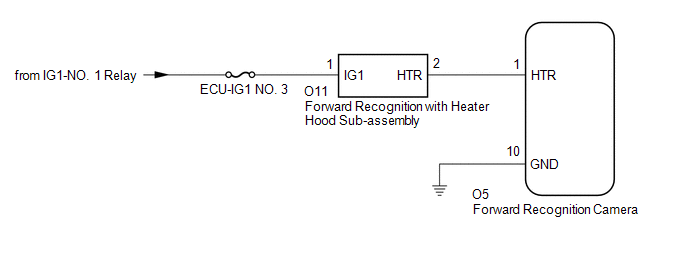
CAUTION / NOTICE / HINT
NOTICE:
- Inspect the fuses for circuits related to this system before performing the following procedure.
- When replacing the forward recognition camera, always replace it with a
new one. If a forward recognition camera which was installed to another
vehicle is used, the information stored in the forward recognition
camera will not match the information from the vehicle. As a result, a
DTC may be stored.
- If the forward recognition camera has been replaced with a new one, be sure to perform forward recognition camera adjustment.
Click here 
PROCEDURE
(a) Clear the DTCs.
Chassis > Front Recognition Camera > Clear DTCs
(b) Make sure that the DTC detection conditions are met.
HINT:
If the detection conditions are not met, the system cannot detect the malfunction.
(c) Check for DTCs.
Chassis > Front Recognition Camera > Trouble Codes
|
Result | Proceed to |
|
DTC C1AAE is not output |
A |
| DTC C1AAE is output |
B |
| A |
 | USE SIMULATION METHOD TO CHECK |
|
B |
 | |
| 2. |
INSPECT FORWARD RECOGNITION WITH HEATER HOOD SUB-ASSEMBLY |
(a) Turn the power switch off.
| (b) Disconnect the O11 forward recognition with heater hood sub-assembly connector. |
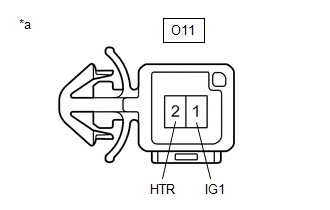 |
|
*a | Component without harness connected
(Forward Recognition with Heater Hood Sub-assembly) | | |
(c) Measure the resistance according to the value(s) in the table below.
Standard Resistance:
|
Tester Connection | Condition |
Specified Condition |
|
O11-1 (IG1) - O11-2 (HTR) |
Power switch off | 38 to 42 Ω |
(d) Connect the O11 forward recognition with heater hood sub-assembly connector.
| NG |
 | REPLACE FORWARD RECOGNITION WITH HEATER HOOD SUB-ASSEMBLY |
|
OK |
 | |
| 3. |
CHECK HARNESS AND CONNECTOR (POWER SOURCE VOLTAGE) |
| (a) Disconnect the O11 forward recognition with heater hood sub-assembly connector. |
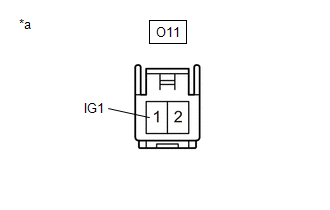 |
|
*a | Front view of wire harness connector
(to Forward Recognition with Heater Hood Sub-assembly) | | |
(b) Measure the voltage according to the value(s) in the table below.
Standard Voltage:
|
Tester Connection | Condition |
Specified Condition |
|
O11-1 (IG1) - Body ground |
Power switch on (IG) |
11 to 14 V |
|
Power switch off | Below 1.5 V |
(c) Connect the O11 forward recognition with heater hood sub-assembly connector.
| NG |
 | REPAIR OR REPLACE HARNESS OR CONNECTOR (POWER SOURCE CIRCUIT) |
|
OK |
 | |
| 4. |
CHECK HARNESS AND CONNECTOR (FORWARD RECOGNITION WITH HEATER HOOD SUB-ASSEMBLY - FORWARD RECOGNITION CAMERA) |
(a) Disconnect the O11 forward recognition with heater hood sub-assembly connector.
(b) Disconnect the O5 forward recognition camera connector.
(c) Measure the resistance according to the value(s) in the table below.
Standard Resistance:
|
Tester Connection | Condition |
Specified Condition |
|
O11-2 (HTR) - O5-1 (HTR) |
Always | Below 1 Ω |
|
O11-2 (HTR) or O5-1 (HTR) - Body ground |
Always | 10 kΩ or higher |
(d) Connect the O5 forward recognition camera connector.
(e) Connect the O11 forward recognition with heater hood sub-assembly connector.
| NG |
 | REPAIR OR REPLACE HARNESS OR CONNECTOR (FORWARD RECOGNITION WITH HEATER HOOD SUB-ASSEMBLY - FORWARD RECOGNITION CAMERA) |
|
OK |
 | |
| 5. |
CHECK HARNESS AND CONNECTOR (FORWARD RECOGNITION CAMERA - BODY GROUND) |
(a) Turn the power switch off.
(b) Disconnect the O5 forward recognition camera connector.
(c) Measure the resistance according to the value(s) in the table below.
Standard Resistance:
|
Tester Connection | Condition |
Specified Condition |
|
O5-10 (GND) - Body ground |
Always | Below 1 Ω |
(d) Connect the O5 forward recognition camera connector.
| OK |
 | REPLACE FORWARD RECOGNITION CAMERA |
| NG |
 | REPAIR OR REPLACE HARNESS OR CONNECTOR (FORWARD RECOGNITION CAMERA - BODY GROUND) |
Data List / Active Test
DATA LIST / ACTIVE TEST
DATA LIST
NOTICE:
In
the table below, the values listed under "Normal Condition" are
reference values. Do not depend solely on these reference values when
deciding whether a part is faulty or not.
HINT:
Using
the Techstream to read the Data List allows the values or states of
switches, sensors, actuators and other items to be read without removing
any parts. This non-intrusive inspection can be very useful because
intermittent conditions or signals may be discovered before parts or
wiring is disturbed. Reading the Data List information early in
troubleshooting is one way to save diagnostic time.
(a) Connect the Techstream to the DLC3.
(b) Turn the power switch on (IG).
(c) Turn the Techstream on.
(d) Enter the following menus: Chassis / Front Recognition Camera / Data List.
(e) Read the Data List according to the display on the Techstream.
Chassis > Front Recognition Camera > Data List
|
Tester Display | Measurement Item |
Range | Normal Condition |
Diagnostic Note |
|
Blockage Status | Camera obstruction malfunction status |
ON or OFF | ON: Forward recognition camera obstructed
OFF: Forward recognition camera not obstructed |
- |
| Blockage History |
Camera obstruction history status |
ON or OFF | ON: Forward recognition camera obstruction history exists
OFF: Forward recognition camera obstruction history does not exist |
- |
| Low Temperature Status |
Low temperature malfunction status |
ON or OFF | ON: Forward recognition camera low temperature malfunction exists
OFF: Forward recognition camera low temperature malfunction does not exist |
- |
| Low Temperature History |
Low temperature history status |
ON or OFF | ON: Forward recognition camera low temperature history exists
OFF: Forward recognition camera low temperature history does not exist |
- |
| High Temperature Status1 |
High temperature malfunction status |
ON or OFF | ON: Forward recognition camera high temperature malfunction exists
OFF: Forward recognition camera high temperature malfunction does not exist |
- |
| High Temperature History1 |
High temperature history status |
ON or OFF | ON: Forward recognition camera high temperature history exists
OFF: Forward recognition camera high temperature history does not exist |
- |
| High Temperature Status2 |
High temperature malfunction status |
ON or OFF | ON: Forward recognition camera high temperature malfunction exists
OFF: Forward recognition camera high temperature malfunction does not exist |
- |
| High Temperature History2 |
High temperature history status |
ON or OFF | ON: Forward recognition camera high temperature history exists
OFF: Forward recognition camera high temperature history does not exist |
- |
| Backlight Status |
Backlight Status | OFF or Driving Backlight |
OFF: Not driving towards the sun Driving Backlight: Driving towards the sun |
- |
| Vehicle Information (2WD/4WD) |
Vehicle information (drivetrain) stored in forward recognition camera |
2WD, 4WD or Unknown | 2WD: for 2WD
4WD: for AWD Unknown: Vehicle information not confirmed |
- |
| Vehicle Information (Conv/HV) |
Vehicle information (conventional/hybrid) stored in forward recognition camera |
Conv, HV or Unknown | Conv: Conventional
HV: Hybrid vehicle Unknown: Vehicle information not confirmed |
- |
| Heater Connection |
Forward recognition with heater hood sub-assembly connection state |
ON or OFF | ON: Forward recognition with heater hood sub-assembly connected
OFF: Forward recognition with heater hood sub-assembly not connected |
- |
| Heater Control Status |
Forward recognition with heater hood sub-assembly control state |
Permit or Prohibit | Permit: Control permitted
Prohibit: Control prohibited |
- |
| Heater Activation |
Forward recognition with heater hood sub-assembly operation state |
ON or OFF | ON: Forward recognition with heater hood sub-assembly operating
OFF: Forward recognition with heater hood sub-assembly not operating |
- |
ACTIVE TEST
HINT:
Using
the Techstream to perform Active Tests allows relays, VSVs, actuators
and other items to be operated without removing any parts. This
non-intrusive functional inspection can be very useful because
intermittent operation may be discovered before parts or wiring is
disturbed. Performing Active Tests early in troubleshooting is one way
to save diagnostic time. Data List information can be displayed while
performing Active Tests.
(a) Connect the Techstream to the DLC3.
(b) Turn the power switch on (IG).
(c) Turn the Techstream on.
(d) Enter the following menus: Chassis / Front Recognition Camera / Active Test.
(e) Perform Active Test according to the display on the Techstream.
HINT:
The power switch must be turned on (IG) to proceed with the Active Test using the Techstream.
Chassis > Front Recognition Camera > Active Test
|
Tester Display | Measurement Item |
Control Range | Diagnostic Note |
|
PCS Buzzer | Sounds PCS Buzzer |
ON/OFF | Test possible with power switch on (IG), vehicle stopped |
Diagnostic Trouble Code Chart
DIAGNOSTIC TROUBLE CODE CHART
Front Camera System |
DTC No. | Detection Item |
Link |
| C1A10 |
Front Radar Sensor |
 |
|
C1A11 | Front Radar Sensor Incorrect Axial Gap |
 |
|
C1A14 | Front Radar Sensor Beam Axis Not Adjusted |
 |
|
C1AA0 | Front Camera Module Circuit |
 |
|
C1AA1 | FCM Destination Information Unmatched |
 |
|
C1AA3 | Vehicle Speed Sensor Circuit |
 |
|
C1AA4 | Yaw Rate Sensor Circuit |
 |
|
C1AA5 | Yaw Rate Sensor Power Supply Voltage Circuit |
 |
|
C1AA6 | Yaw Rate Sensor Zero Point Malfunction |
 |
|
C1AA9 | Front Camera Module Beam Axis Not Adjusted |
 |
|
C1AAA | FCM Destination Information Uninitialized |
 |
|
C1AAE | Heater Circuit |
 |
|
U0101 | Lost Communication with TCM |
 |
|
U0123 | Lost Communication with Yaw Rate Sensor Module |
 |
|
U0129 | Lost Communication with Brake System Control Module |
 |
|
U0142 | Lost Communication with Body Control Module "B" |
 |
|
U0235 | Lost Communication with Cruise Control Front Distance Range Sensor |
 |
|
U0293 | Lost Communication with HV ECU |
 |
|
U1104 | Lost Communication with Driving Support ECU |
 |
Dtc Check / Clear
DTC CHECK / CLEAR
CHECK DTC
(a) Connect the Techstream to the DLC3.
(b) Turn the power switch on (IG).
(c) Turn the Techstream on.
(d) Enter the following menus: Chassis / Front Recognition Camera / Trouble Codes.
(e) Check for details of the DTCs.
Click here

Chassis > Front Recognition Camera > Trouble Codes
CLEAR DTC
(a) Connect the Techstream to the DLC3.
(b) Turn the power switch on (IG).
(c) Turn the Techstream on.
(d) Enter the following menus: Chassis / Front Recognition Camera / Clear DTCs.
(e) Clear the DTCs.
Chassis > Front Recognition Camera > Clear DTCsFail-safe Chart
FAIL-SAFE CHART
FAIL-SAFE FUNCTION
(a)
If a malfunction is detected in the front camera system, the systems
that use the forward recognition camera perform the fail-safe function.
Freeze Frame Data
FREEZE FRAME DATA
DESCRIPTION
(a)
Whenever a front camera system DTC is stored, the forward recognition
camera stores the current vehicle state (ECU and sensor information) as
Freeze Frame Data.
CHECK FREEZE FRAME DATA
(a) Connect the Techstream to the DLC3.
(b) Turn the power switch on (IG).
(c) Turn the Techstream on.
(d) Enter the following menus: Chassis / Front Recognition Camera / Trouble Codes.
Chassis > Front Recognition Camera > Trouble Codes
(e) According to the display on the Techstream, select a DTC with freeze frame data.
(f) Read the freeze frame data recorded when the DTC was stored.
Chassis > Front Recognition Camera
|
Tester Display | Measurement Item |
Range | Normal Condition |
Diagnostic Note |
|
Blockage Status | Camera obstruction malfunction status |
ON or OFF | ON: Forward recognition camera obstructed
OFF: Forward recognition camera not obstructed |
- |
| Blockage History |
Camera obstruction history status |
ON or OFF | ON: Forward recognition camera obstruction history exists
OFF: Forward recognition camera obstruction history does not exist |
- |
| Low Temperature Status |
Low temperature malfunction status |
ON or OFF | ON: Forward recognition camera low temperature malfunction exists
OFF: Forward recognition camera low temperature malfunction does not exist |
- |
| Low Temperature History |
Low temperature history status |
ON or OFF | ON: Forward recognition camera low temperature history exists
OFF: Forward recognition camera low temperature history does not exist |
- |
| High Temperature Status1 |
High temperature malfunction status |
ON or OFF | ON: Forward recognition camera high temperature malfunction exists
OFF: Forward recognition camera high temperature malfunction does not exist |
- |
| High Temperature History1 |
High temperature history status |
ON or OFF | ON: Forward recognition camera high temperature history exists
OFF: Forward recognition camera high temperature history does not exist |
- |
| High Temperature Status2 |
High temperature malfunction status |
ON or OFF | ON: Forward recognition camera high temperature malfunction exists
OFF: Forward recognition camera high temperature malfunction does not exist |
- |
| High Temperature History2 |
High temperature history status |
ON or OFF | ON: Forward recognition camera high temperature history exists
OFF: Forward recognition camera high temperature history does not exist |
- |
| Backlight Status |
Backlight Status | OFF or Driving Backlight |
OFF: Not driving towards the sun Driving Backlight: Driving towards the sun |
- |
| Vehicle Information (2WD/4WD) |
Vehicle information (drivetrain) stored in forward recognition camera |
2WD, 4WD or Unknown | 2WD: for 2WD
4WD: for AWD Unknown: Vehicle information not confirmed |
- |
| Vehicle Information (Conv/HV) |
Vehicle information (conventional/hybrid) stored in forward recognition camera |
Conv, HV or Unknown | Conv: Conventional
HV: Hybrid vehicle Unknown: Vehicle information not confirmed |
- |
How To Proceed With Troubleshooting
CAUTION / NOTICE / HINT
HINT:
- Use these procedures to troubleshoot the front camera system.
- *: Use the Techstream.
PROCEDURE
|
1. | VEHICLE BROUGHT TO WORKSHOP |
|
NEXT |
 | |
| 2. |
INSPECT AUXILIARY BATTERY VOLTAGE |
(a) Measure the auxiliary battery voltage with the power switch off.
Standard Voltage:
11 to 14 V
If the voltage is below 11 V, replace or recharge the auxiliary battery before proceeding to the next step.
|
NEXT |
 | |
| 3. |
CHECK CAN COMMUNICATION SYSTEM* |
(a) Using the Techstream, check if the CAN communication system is functioning normally.
HINT:
Refer to CAN Bus Check in CAN Communication System.
Click here

OK:
CAN communication system is functioning normally.
| NG |
 | GO TO CAN COMMUNICATION SYSTEM |
|
OK |
 | |
HINT:
Refer to DTC Check / Clear.
Click here 
(a) Check for DTCs and note any codes that are output.
Chassis > Front Recognition Camera > Trouble Codes
(b) Clear the DTCs.
Chassis > Front Recognition Camera > Clear DTCs
(c) Recheck for DTCs. Try to reproduce the DTCs by duplicating the conditions indicated by the DTCs.
Chassis > Front Recognition Camera > Trouble Codes
|
Result | Proceed to |
|
DTCs are not output | A |
|
DTCs are output | B |
| B |
 | GO TO DTC CHART |
|
A |
 | |
| 5. |
PROBLEM SYMPTOMS TABLE |
HINT:
Refer to Problem Symptoms Table.
Click here 
|
Result | Proceed to |
|
Fault is not listed in Problem Symptoms Table |
A |
| Fault is listed in Problem Symptoms Table |
B |
| B |
 | GO TO STEP 7 |
|
A |
 | |
| 6. |
OVERALL ANALYSIS AND TROUBLESHOOTING* |
(a) Terminals of ECU
Click here 
(b) Data List / Active Test
Click here 
|
NEXT |
 | |
| 7. |
ADJUST, REPAIR OR REPLACE |
NOTICE:
If
the forward recognition camera has been replaced with a new one, it is
necessary to perform forward recognition camera adjustment.
Click here

|
NEXT |
 | |
| NEXT |
 | END |
Parts Location
PARTS LOCATION
ILLUSTRATION
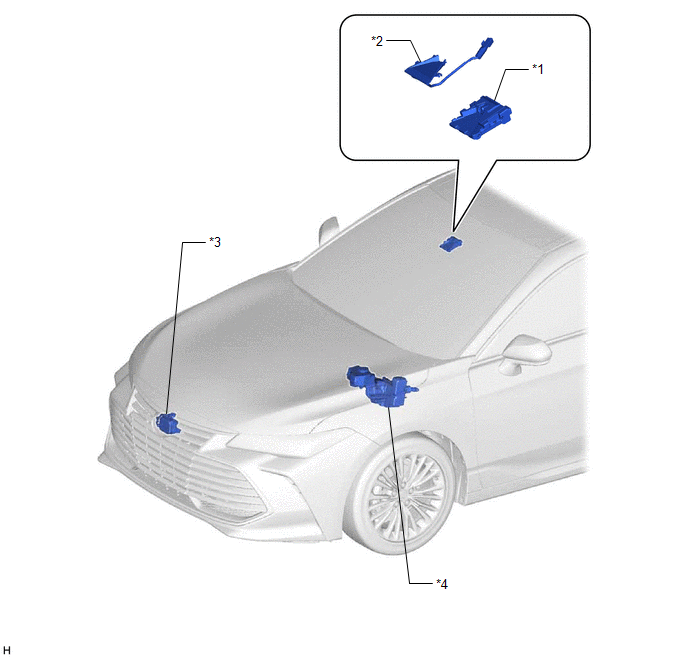
|
*1 | FORWARD RECOGNITION CAMERA |
*2 | FORWARD RECOGNITION WITH HEATER HOOD SUB-ASSEMBLY |
|
*3 | MILLIMETER WAVE RADAR SENSOR ASSEMBLY |
*4 | BRAKE BOOSTER WITH MASTER CYLINDER ASSEMBLY
- SKID CONTROL ECU |
ILLUSTRATION
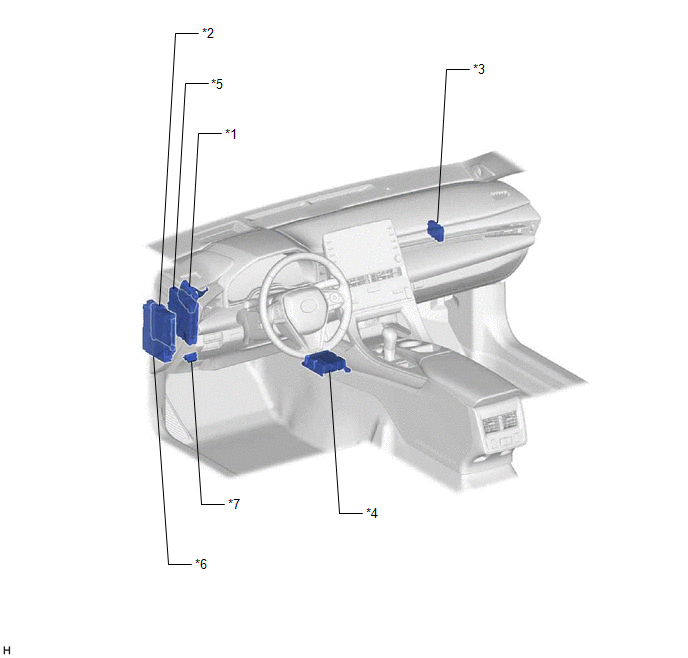
|
*1 | DRIVING SUPPORT ECU ASSEMBLY |
*2 | MAIN BODY ECU (MULTIPLEX NETWORK BODY ECU) |
|
*3 | CENTRAL GATEWAY ECU (NETWORK GATEWAY ECU) |
*4 | AIRBAG ECU ASSEMBLY - YAW RATE SENSOR |
|
*5 | HYBRID VEHICLE CONTROL ECU |
*6 | INSTRUMENT PANEL JUNCTION BLOCK ASSEMBLY
- ECU-IG1 NO. 3 FUSE |
|
*7 | DLC3 |
- | - |
Precaution
PRECAUTION
PRECAUTION FOR DISCONNECTING CABLE FROM NEGATIVE AUXILIARY BATTERY TERMINAL
NOTICE:
When
disconnecting the cable from the negative (-) auxiliary battery
terminal, initialize the following systems after the cable is
reconnected.
|
System Name | See Procedure |
|
Lane Departure Alert System (w/ Steering Control) |
 |
|
Pre-collision System |
|
Intelligent Clearance Sonar System |
|
Lighting System (w/ Cornering Light) |
|
Parking Assist Monitor System |
|
Panoramic View Monitor System |
PRECAUTIONS FOR SERVICING VEHICLE EQUIPPED WITH FORWARD RECOGNITION CAMERA
(a)
When running the vehicle on a chassis dynamometer, cover the area in
front of the forward recognition camera to prevent it from operating.
HINT:
- The front camera system captures the image ahead of the vehicle using
the monocular camera and learns the direction of traffic while driving.
When the actual driving situation is different from what is determined
by the forward recognition camera, such as when running the vehicle on a
chassis dynamometer, the front camera system may learn incorrect
information.
- When the forward recognition camera is covered, the message "Front
Camera Unavailable Remove Debris On Windshield" is displayed on the
multi-information display. The message will disappear and the operation
of the front camera system will return to normal after the cover is
removed.
HANDLING PRECAUTIONS FOR FORWARD RECOGNITION CAMERA
(a) The forward recognition camera is a precision part. Be sure to observe the following precautions when handling it.
(1) Do not apply excessive force to the forward recognition camera or subject it to a strong impact.
(2) Do not disassemble the forward recognition camera.
(3) Do not change the installation position of the forward recognition camera or modify the surrounding components.
(4) Do not touch the forward recognition camera lens when replacing the forward recognition camera.
HINT:
If the forward recognition camera lens is touched, replace the forward recognition camera with a new one.
PRECAUTION FOR REPLACING FORWARD RECOGNITION CAMERA
(a)
If the forward recognition camera has been replaced with a new one or
the windshield glass has been removed and installed, it is necessary to
perform forward recognition camera adjustment. If the system is turned
on without performing forward recognition camera adjustment, DTC C1AA9
will be stored.
Click here 
(b)
When replacing the forward recognition camera, replace it with a new
one. If a forward recognition camera which was installed to another
vehicle is used, the information stored in the forward recognition
camera will not match the information from the vehicle and a DTC may be
stored.
(c) When replacing the forward recognition
camera, do not damage the camera lens or allow it to become contaminated
with foreign matter.
(d) Do not reuse a forward recognition camera that has been dropped or subjected to a strong impact.
HANDLING PRECAUTIONS FOR CAN COMMUNICATION SYSTEM
(a)
First check the CAN communication system by following How to Proceed
with Troubleshooting. After checking that there are no malfunctions in
the CAN communication system, proceed with troubleshooting.
Click here

PRECAUTIONS FOR COMPONENTS SURROUNDING FORWARD RECOGNITION CAMERA
(a) Be sure to use Toyota genuine front wiper blades.
HINT:
If
non-Toyota genuine parts are used, the forward recognition camera view
may be blocked, affecting the operation of systems that use the forward
recognition camera.
(b) Be sure to replace the wiper rubbers before they wear out.
HINT:
If
streaks are left on the windshield glass, the forward recognition
camera may not operate properly, affecting the operation of systems that
use the forward recognition camera.
(c) Do not install any accessories to the front of the vehicle such as the engine hood or front grill.
HINT:
The forward recognition camera view may be blocked, affecting the operation of systems that use the forward recognition camera.
(d) Do not allow any objects mounted on the roof rack to obstruct the area in front of the forward recognition camera.
HINT:
The forward recognition camera view may be blocked, affecting the operation of systems that use the forward recognition camera.
(e) Keep the windshield glass clean.
HINT:
If
the windshield glass is dirty, fogged up or has an oily film, the
forward recognition camera may not operate properly, affecting the
operation of systems that use the forward recognition camera.
(f)
Do not attach any stickers or install any accessories to the area of
the windshield glass in front of the forward recognition camera.
HINT:
- If it is necessary to attach a sticker or install an accessory to the
windshield glass, do not attach it to the area in front of the forward
recognition camera.
- If a sticker or accessory is installed to the windshield glass, the
forward recognition camera view may be blocked, affecting the operation
of systems that use the forward recognition camera.
(g) Even if a water repellent glass
coating is applied to the windshield, it is still necessary to use the
wipers if the area in front of the forward recognition camera is covered
with water droplets.
(h) If the windshield glass is chipped or cracked, replace it.
(i)
When replacing the windshield glass of a vehicle equipped with a
forward recognition camera, make sure to use a Toyota genuine part.
HINT:
If
a non-Toyota genuine part is used, the forward recognition camera may
not be able to be installed due to a missing bracket or the front camera
system may not operate properly due to a difference in the
transmissivity or black ceramic border.
FEATURES OF FORWARD RECOGNITION CAMERA
(a)
The forward recognition camera has characteristics similar to those of
human eyes. When the visibility is poor for the driver, the forward
recognition camera may not properly detect lane markers or vehicles and
objects on the road ahead.
(b) Only the objects in the forward recognition camera detection area can be detected.
(c)
The forward recognition camera has a function to detect foreign matter
in the area in front of the forward recognition camera.
HINT:
The forward recognition camera may not always detect dirt in the area in front of the forward recognition camera.
(d)
In the following situations, the forward recognition camera may not
detect objects such as a preceding vehicle, pedestrians or lane makers:
(1) When driving in inclement weather such as heavy rain or snow, dense fog, a sandstorm, etc.
(2) When the view of the forward recognition camera is obscured by steam, sand, smoke, water, snow or dust.
(3)
When an intensely bright light, such as the sun or high beams of an
oncoming vehicle shine directly into the forward recognition camera.
(4) When the surrounding area is dim, such as at dawn or dusk.
(5) When the headlights of the vehicle are turned off at night or in a tunnel.
(6) The contrast of the area around the vehicle is poor due to snow, etc.
(7) When the ambient temperature is low, the heater is operating with FOOT mode selected.
HINT:
If the upper area of the windshield glass fogs up, the system may not operate.
(e) In the following situations, the forward recognition camera may not be detect objects appropriately:
(1)
When the vehicle is being driven where a sudden change in brightness
occurs, such as at the entrance or exit of a tunnel or in the shade.
(2) When the forward recognition camera is facing upward or downward due to inclination of the vehicle when overloaded.
(3) When the vehicle height is not standard due to modified suspension or non-standard tires.
(4) When the windshield glass is covered with water drops, snow, ice, dirt, frost, dust, oil, etc.
(5) When the windshield glass is fogged-up.
(6) When rain drops, washer fluid, or a wiper blade blocks the forward recognition camera.
(7) An object mounted on the roof rack is obstructing the area in front of the forward recognition camera.
(f) The front camera system may not operate properly in any of the following conditions:
(1)
The forward recognition camera is misaligned or damaged due to a strong
impact being applied to the camera or the area around it.
(2) The cabin temperature is extremely high.
(3) The cabin temperature is extremely low.
(4) Immediately after the hybrid system is started.
Problem Symptoms Table
PROBLEM SYMPTOMS TABLE
HINT:
- Use the table below to help determine the cause of problem symptoms. If
multiple suspected areas are listed, the potential causes of the
symptoms are listed in order of probability in the "Suspected Area"
column of the table. Check each symptom by checking the suspected areas
in the order they are listed. Replace parts as necessary.
- Inspect the fuses and relays related to this system before inspecting the suspected areas below.
Front Camera System |
Symptom | Suspected Area |
Link |
|
The message "Front Camera Unavailable Remove Debris On Windshield" is frequently displayed |
Non-Toyota genuine front wiper blades are installed |
- |
| The front wiper rubbers are worn |
- |
| A sticker, accessory or other object is obstructing the forward recognition camera |
- |
| There is snow, frost, dirt, dust or oil on the windshield glass, or the windshield glass is fogged up |
- |
| A glass coating has been applied to the windshield glass |
- |
| The windshield glass is chipped or cracked |
- |
| Non-Toyota genuine windshield glass is installed |
- |
| Forward recognition camera |
 |
|
The message "Front Camera Unavailable" is frequently displayed |
Immediately after the hybrid system is started |
- |
| The cabin temperature is extremely high |
- |
| The cabin temperature is extremely low |
- |
| Forward recognition camera |
 |
|
A system that uses the forward recognition camera does not operate |
Forward recognition camera |
 |
System Diagram
SYSTEM DIAGRAM
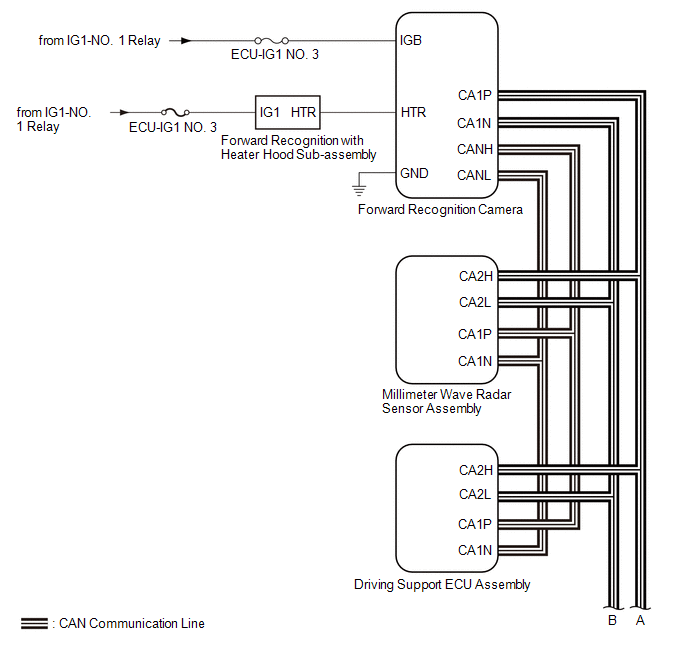
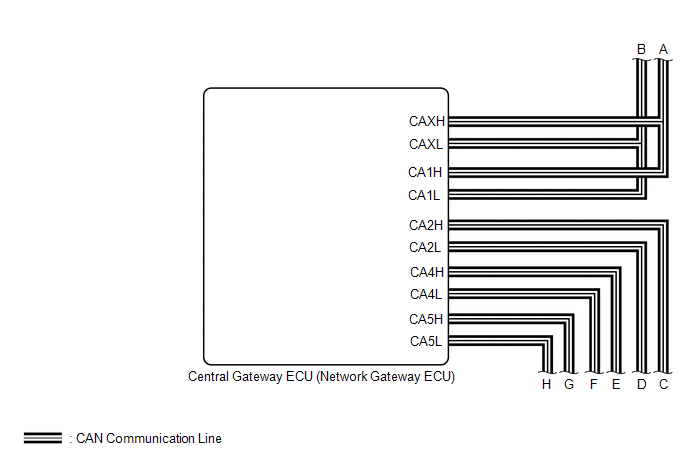
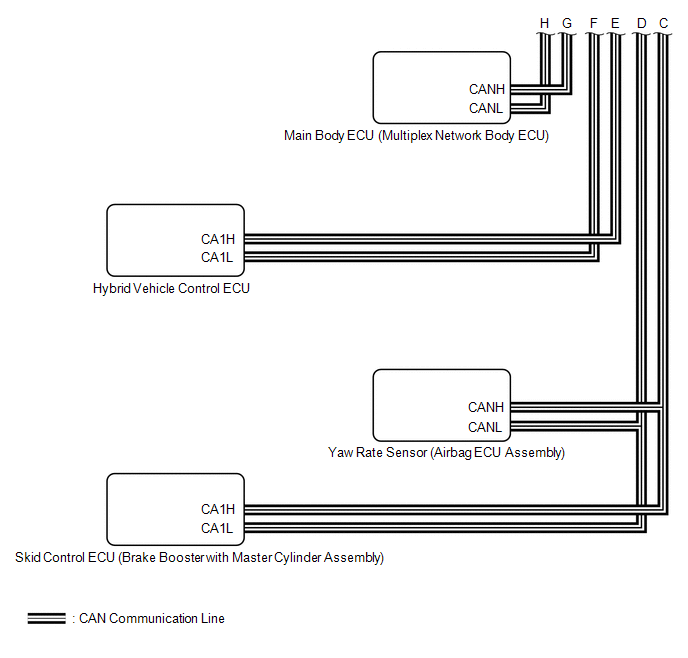 Communication Table
Communication Table |
Sender | Receiver |
Signal | Line |
|
Forward Recognition Camera | Main Body ECU (Multiplex Network Body ECU) |
Automatic high beam control signal |
CAN |
| Driving Support ECU Assembly |
Forward Recognition Camera | PCS control information signal |
CAN |
| Hybrid Vehicle Control ECU |
Forward Recognition Camera |
- Shift position signal (P, R, N, D)
- Engine type information signal
- Vehicle specification information (2WD/4WD information, conventional/ hybrid information)
- Cruise control system control signal
| CAN |
|
Main Body ECU (Multiplex Network Body ECU) |
Forward Recognition Camera | Vehicle specification information (destination) |
CAN |
| Skid Control ECU (Brake Booster with Master Cylinder Assembly) |
Forward Recognition Camera |
- Vehicle speed signal
- Stop light switch signal
- Vehicle yaw rate sensor zero point malfunction signal
- Electronically controlled brake system operation signal
- Electronically controlled brake system malfunction signal
| CAN |
|
Yaw Rate Sensor (Airbag ECU Assembly) |
Forward Recognition Camera | Vehicle yaw rate sensor signal |
CAN |
Terminals Of Ecu
TERMINALS OF ECU
NOTICE:
- DTCs may be output when connectors are disconnected during inspection.
Therefore, be sure to clear the DTCs using the Techstream once the
inspection has been completed.
- Do not apply excessive force to the O5 forward recognition camera connector.

CHECK FORWARD RECOGNITION CAMERA
(a) Measure the voltage and resistance according to the value(s) in the table below.
|
Terminal No. (Symbol) | Wiring Color |
Terminal Description | Condition |
Specified Condition |
|
O5-7 (IGB) - O5-10 (GND) |
LA-P - LA |
Power source | Power switch on (IG) |
11 to 14 V |
|
Power switch off | Below 1 V |
|
O5-10 (GND) - Body ground |
LA - Body ground | Ground |
Always | Below 1 Ω |
(b) Measure the voltage according to the value(s) in the table below.
|
Terminal No. (Symbol) | Wiring Color |
Terminal Description | Condition |
Specified Condition |
|
O5-1 (HTR) - O5-10 (GND) |
B - LA | Forward recognition with heater hood sub-assembly operation signal |
Power switch on (IG) Forward recognition with heater hood sub-assembly not operating |
11 to 14 V |
|
Power switch on (IG) Forward recognition with heater hood sub-assembly operating |
Below 1 V |
(c) Check for pulses according to the value(s) in the table below.
HINT:
If
the waveform is not similar to that shown in the illustration, a
malfunction of a CAN bus line, terminating resistor, or the forward
recognition camera is suspected.
|
Terminal No. (Symbol) | Wiring Color |
Terminal Description | Condition |
Specified Condition |
|
O5-5 (CA1P) - O5-10 (GND) |
L - LA | CAN communication signal |
Power switch on (IG) |
Pulse generation (See waveform 1) |
|
O5-11 (CA1N) - O5-10 (GND) |
W - LA | CAN communication signal |
Power switch on (IG) |
Pulse generation (See waveform 2) |
|
O5-6 (CANH) - O5-10 (GND) |
G - LA | CAN communication signal |
Power switch on (IG) |
Pulse generation (See waveform 1) |
|
O5-12 (CANL) - O5-10 (GND) |
W - LA | CAN communication signal |
Power switch on (IG) |
Pulse generation (See waveform 2) |
(1) WAVEFORM 1
|
Item | Content |
|
Terminal Name | Between O5-5 (CA1P) and O5-10 (GND)
Between O5-6 (CANH) and O5-10 (GND) |
|
Tester Range | 1 V/DIV., 10 ÎĽsec./DIV. |
|
Condition | Power switch on (IG) |
HINT:
The waveform varies depending on the CAN communication signal.
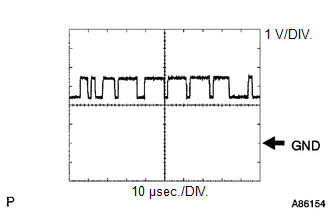
(2) WAVEFORM 2
|
Item | Content |
|
Terminal Name | Between O5-11 (CA1N) and O5-10 (GND)
Between O5-12 (CANL) and O5-10 (GND) |
|
Tester Range | 1 V/DIV., 10 ÎĽsec./DIV. |
|
Condition | Power switch on (IG) |
HINT:
The waveform varies depending on the CAN communication signal.
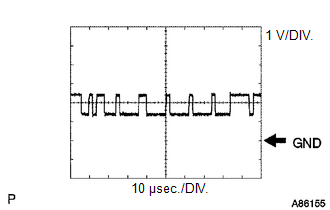
Lost Communication with TCM (U0101,U0123,U0129,U0142,U0293)
DESCRIPTION
When a malfunction is detected between various ECUs and sensors, these DTCs are stored.
|
DTC No. | Detection Item |
DTC Detection Condition | Trouble Area |
|
U0101 | Lost Communication with TCM |
While
the vehicle is being driven at 1 km/h or 1 mph or more, a communication
error between the TCM (hybrid vehicle control ECU) and the forward
recognition camera is detected for approximately 5 seconds or more. |
CAN communication system |
|
U0123 | Lost Communication with Yaw Rate Sensor Module |
While
the vehicle is being driven at 1 km/h or 1 mph or more, a communication
error between the yaw rate sensor (airbag ECU assembly) and the forward
recognition camera is detected for approximately 5 seconds or more. |
CAN communication system |
|
U0129 | Lost Communication with Brake System Control Module |
2
seconds after the power switch is turned on (IG), a communication error
between the skid control ECU (brake booster with master cylinder
assembly) and the forward recognition camera is detected for
approximately 5 seconds or more. | CAN communication system |
|
U0142 | Lost Communication with Body Control Module "B" |
2
seconds after the power switch is turned on (IG), a communication error
between the main body ECU (multiplex network body ECU) and the forward
recognition camera is detected for approximately 5 seconds or more. |
CAN communication system |
|
U0293 | Lost Communication with HV ECU |
2
seconds after the power switch is turned on (IG), a communication error
between the hybrid vehicle control ECU and the forward recognition
camera is detected for approximately 5 seconds. |
CAN communication system |
PROCEDURE
(a) Clear the DTCs.
Chassis > Front Recognition Camera > Clear DTCs
(b) Make sure that the DTC detection conditions are met.
HINT:
If the detection conditions are not met, the system cannot detect the malfunction.
(c) Check for DTCs.
Chassis > Front Recognition Camera > Trouble Codes
|
Result | Proceed to |
|
DTC U0101, U0123, U0129, U0142 and U0293 are not output |
A |
| DTC U0101, U0123, U0129, U0142 or U0293 is output |
B |
| A |
 | USE SIMULATION METHOD TO CHECK |
| B |
 | GO TO CAN COMMUNICATION SYSTEM |
Lost Communication with Cruise Control Front Distance Range Sensor (U0235)
DESCRIPTION
The forward
recognition camera communicates with the millimeter wave radar sensor
assembly via CAN communication. If there is a communication error with
the millimeter wave radar sensor assembly, the forward recognition
camera stores DTC U0235.
|
DTC No. | Detection Item |
DTC Detection Condition | Trouble Area |
|
U0235 | Lost Communication with Cruise Control Front Distance Range Sensor |
2
seconds after the power switch is turned on (IG), a communication error
between the millimeter wave radar sensor assembly and the forward
recognition camera is detected for approximately 5 seconds. |
- CAN communication system
- CAN bus line
- Millimeter wave radar sensor assembly
- Forward recognition camera
|
WIRING DIAGRAM
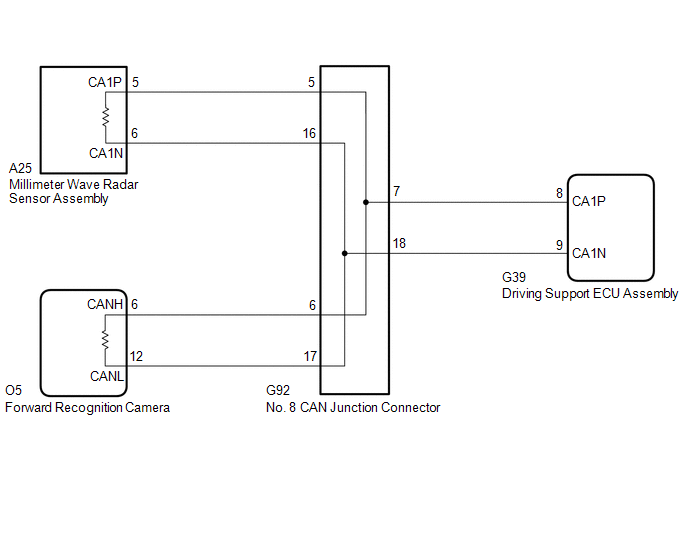
CAUTION / NOTICE / HINT
NOTICE:
- Inspect the fuses for circuits related to this system before performing the following procedure.
- When replacing the millimeter wave radar sensor assembly, always replace
it with a new one. If a millimeter wave radar sensor assembly which was
installed to another vehicle is used, the information stored in the
millimeter wave radar sensor assembly will not match the information
from the vehicle. As a result, a DTC may be stored.
- When the millimeter wave radar sensor assembly is replaced with a new
one, adjustment of the radar sensor beam axis must be performed.
Click here 
- When replacing the forward recognition camera, always replace it with a
new one. If a forward recognition camera which was installed to another
vehicle is used, the information stored in the forward recognition
camera will not match the information from the vehicle. As a result, a
DTC may be stored.
- If the forward recognition camera has been replaced with a new one, be sure to perform forward recognition camera adjustment.
Click here 
PROCEDURE
|
1. | READ VALUE USING TECHSTREAM (CAN BUS CHECK) |
(a) Connect the Techstream to the DLC3.
(b) Turn the power switch on (IG).
(c) Turn the Techstream on.
(d) Enter the following menus: System Select / Can Bus Check.
Click here 
CAN Bus Check
|
Result | Proceed to |
|
All of the ECUs and sensors that are currently connected to the CAN communication system are displayed |
A |
| None
of the ECUs and sensors that are currently connected to the CAN
communication system are displayed, or some of them are not displayed |
B |
| B |
 | GO TO CAN COMMUNICATION SYSTEM |
|
A |
 | |
HINT:
When
pre-collision system DTC U1002 is output, check that the local bus is
functioning normally by performing the diagnostic procedure for U1002.
(a) Check for DTCs.
Body Electrical > Pre-Collision 2 > Trouble Codes
|
Result | Proceed to |
|
DTC U1002 is not output |
A |
| DTC U1002 is output |
B |
| B |
 | GO TO PRE-COLLISION SYSTEM |
|
A |
 | |
(a) Turn the power switch off.
(b) Disconnect the cable from the negative (-) auxiliary battery terminal.
| (c) Disconnect the O5 forward recognition camera connector. |
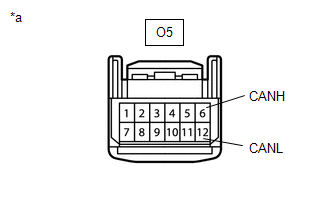 |
|
*a | Front view of wire harness connector
(to Forward Recognition Camera) | | |
(d) Measure the resistance according to the value(s) in the table below.
Standard Resistance:
|
Tester Connection | Condition |
Specified Condition |
|
O5-6 (CANH) - O5-12 (CANL) |
Cable disconnected from negative (-) auxiliary battery terminal |
108 to 132 Ω |
HINT:
If the result is not as specified, a malfunction in a CAN communication line is suspected.
(e) Connect the O5 forward recognition camera connector.
| NG |
 | REPAIR OR REPLACE HARNESS OR CONNECTOR (CAN BUS LINE) |
|
OK |
 | |
(a) Check for DTCs.
Chassis > Front Recognition Camera > Trouble Codes
|
Result | Proceed to |
|
Only DTC U0235 is output |
A |
| DTC U0235 and U1104 are output |
B |
| B |
 | REPLACE FORWARD RECOGNITION CAMERA |
|
A |
 | |
(a) Check for DTCs.
HINT:
The malfunction area can be determined by the combination of DTCs output at the same time.
Body Electrical > Pre-Collision 2 > Trouble Codes Chassis > Front Recognition Camera > Trouble Codes
|
Result | Proceed to |
|
Front camera system (Front Recognition Camera) DTC U0235 and pre-collision system (Pre-Collision 2) DTC U1104 are output. |
A |
| Front camera system (Front Recognition Camera) DTC U0235 and pre-collision system (Pre-Collision 2) DTC U0235 are output. |
|
Only front camera system (Front Recognition Camera) DTC U0235 is output. |
B |
| A |
 | REPLACE MILLIMETER WAVE RADAR SENSOR ASSEMBLY |
| B |
 | REPLACE FORWARD RECOGNITION CAMERA |
Lost Communication with Driving Support ECU (U1104)
DESCRIPTION
The forward
recognition camera communicates with the driving support ECU assembly
via CAN communication. If there is a communication error with the
driving support ECU assembly, the forward recognition camera store DTC
U1104.
|
DTC No. | Detection Item |
DTC Detection Condition | Trouble Area |
|
U1104 | Lost Communication with Driving Support ECU |
2
seconds after the power switch is turned on (IG), a communication error
between the driving support ECU assembly and the forward recognition
camera is detected for approximately 5 seconds. |
- CAN communication system
- CAN bus line
- Driving support ECU assembly
- Forward recognition camera
|
WIRING DIAGRAM
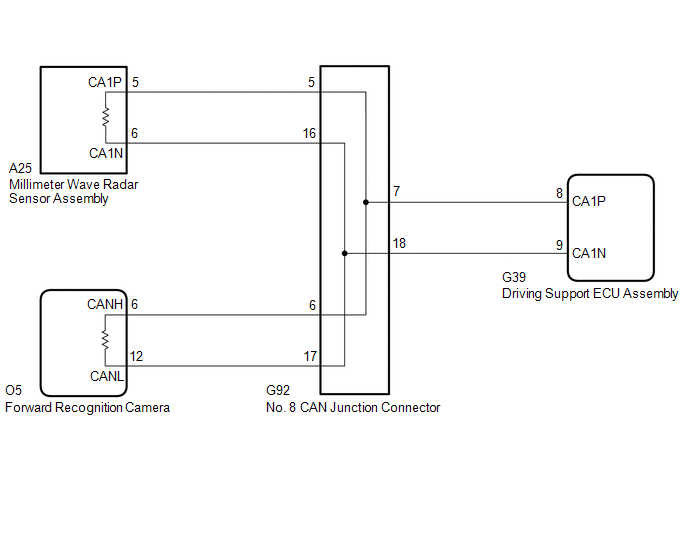
CAUTION / NOTICE / HINT
NOTICE:
- Inspect the fuses for circuits related to this system before performing the following procedure.
- When replacing the driving support ECU assembly, always replace it with a
new one. If a driving support ECU assembly which was installed to
another vehicle is used, the information stored in the driving support
ECU assembly will not match the information from the vehicle. As a
result, a DTC may be stored.
- When replacing the forward recognition camera, always replace it with a
new one. If a forward recognition camera which was installed to another
vehicle is used, the information stored in the forward recognition
camera will not match the information from the vehicle. As a result, a
DTC may be stored.
- If the forward recognition camera has been replaced with a new one, be sure to perform forward recognition camera adjustment.
Click here 
PROCEDURE
|
1. | READ VALUE USING TECHSTREAM (CAN BUS CHECK) |
(a) Connect the Techstream to the DLC3.
(b) Turn the power switch on (IG).
(c) Turn the Techstream on.
(d) Enter the following menus: System Select / Can Bus Check.
Click here 
CAN Bus Check
|
Result | Proceed to |
|
All of the ECUs and sensors that are currently connected to the CAN communication system are displayed |
A |
| None
of the ECUs and sensors that are currently connected to the CAN
communication system are displayed, or some of them are not displayed |
B |
| B |
 | GO TO CAN COMMUNICATION SYSTEM |
|
A |
 | |
(a) Turn the power switch off.
(b) Disconnect the cable from the negative (-) auxiliary battery terminal.
| (c) Disconnect the O5 forward recognition camera connector. |
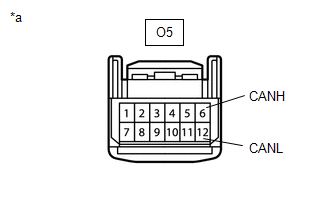 |
|
*a | Front view of wire harness connector
(to Forward Recognition Camera) | | |
(d) Measure the resistance according to the value(s) in the table below.
Standard Resistance:
|
Tester Connection | Condition |
Specified Condition |
|
O5-6 (CANH) - O5-12 (CANL) |
Cable disconnected from negative (-) auxiliary battery terminal |
108 to 132 Ω |
HINT:
If the result is not as specified, a malfunction in a CAN communication line is suspected.
(e) Connect the O5 forward recognition camera connector.
| NG |
 | REPAIR OR REPLACE HARNESS OR CONNECTOR (CAN BUS LINE) |
|
OK |
 | |
(a) Check for DTCs.
Chassis > Front Recognition Camera > Trouble Codes
|
Result | Proceed to |
|
Only DTC U1104 is output |
A |
| DTC U0235 and U1104 are output |
B |
| B |
 | REPLACE FORWARD RECOGNITION CAMERA |
|
A |
 | |
(a) Check for DTCs.
HINT:
The malfunction area can be determined by the combination of DTCs output at the same time.
Body Electrical > Pre-Collision 2 > Trouble Codes Chassis > Front Recognition Camera > Trouble Codes
|
Result | Proceed to |
|
Front camera system (Front Recognition Camera) DTC U1104 and pre-collision system (Pre-Collision 2) DTC U1002 are output. |
A |
| Front camera system (Front Recognition Camera) DTC U1104 and pre-collision system (Pre-Collision 2) DTC U1104 are output. |
B |
| Only front camera system (Front Recognition Camera) DTC U1104 is output. |
C |
| A |
 | GO TO PRE-COLLISION SYSTEM |
| B |
 | REPLACE DRIVING SUPPORT ECU ASSEMBLY |
| C |
 | REPLACE FORWARD RECOGNITION CAMERA |
Utility
UTILITY
NOTICE:
- If the forward recognition camera has been replaced with a new one or
the windshield glass has been removed and installed, it is necessary to
perform forward recognition camera adjustment. If the system is turned
on without performing forward recognition camera adjustment, DTC C1AA9
will be stored.
Click here 
- When replacing the windshield glass of a vehicle equipped with a forward
recognition camera, make sure to use a Toyota genuine part. If a
non-Toyota genuine part is used, the forward recognition camera may not
be able to be installed due to a missing bracket or the front camera
system may not operate properly due to a difference in the
transmissivity or black ceramic border.
RECOGNITION CAMERA/TARGET POSITION MEMORY
HINT:
Recognition Camera/Target Position Memory is used to enter required information into the forward recognition camera.
(a) Perform Recognition Camera/Target Position Memory according to the display on the Techstream.
Click here 
Chassis > Front Recognition Camera > Utility
|
Tester Display |
| Recognition Camera/Target Position Memory |
HINT:
Recognition
Camera Axis Adjust is used to calibrate the internal data of the
forward recognition camera to enhance its recognition accuracy.
RECOGNITION CAMERA AXIS ADJUST
(a) Perform Recognition Camera Axis Adjust according to the display on the Techstream.
Click here 
Chassis > Front Recognition Camera > Utility
|
Tester Display |
| Recognition Camera Axis Adjust |
HINT:
History Clear is used to clear the history of Data List items Blockage, Low Temperature, or High Temperature.
HISTORY CLEAR
(a) Connect the Techstream to the DLC3.
(b) Turn the power switch on (IG).
(c) Turn the Techstream on.
(d) Enter the following menus: Chassis / front recognition camera / Utility / History Clear.
(e) Perform History Clear according to the display on the Techstream.
Chassis > Front Recognition Camera > Utility
|
Tester Display |
| History Clear |
PCS IMAGE INFORMATION CLEAR
HINT:
PCS Image Information Clear is used to clear the PCS Image Information data.
(a) Connect the Techstream to the DLC3.
(b) Turn the power switch on (IG).
(c) Turn the Techstream on.
(d) Enter the following menus: Chassis / front recognition camera / Utility / PCS Image Information Clear.
(e) Perform PCS Image Information Clear according to the display on the Techstream.
Chassis > Front Recognition Camera > Utility
|
Tester Display |
| PCS Image Information Clear |
PCS IMAGE RECORD SETTING
HINT:
PCS Image Record Setting is used to activate/deactivate the PCS image recording function.
(a) Connect the Techstream to the DLC3.
(b) Turn the power switch on (IG).
(c) Turn the Techstream on.
(d) Enter the following menus: Chassis / front recognition camera / Utility / PCS Image Record Setting.
(e) Perform PCS Image Record Setting according to the display on the Techstream.
Chassis > Front Recognition Camera > Utility
|
Tester Display |
| PCS Image Record Setting |







































































































 Communication Table
Communication Table 


































